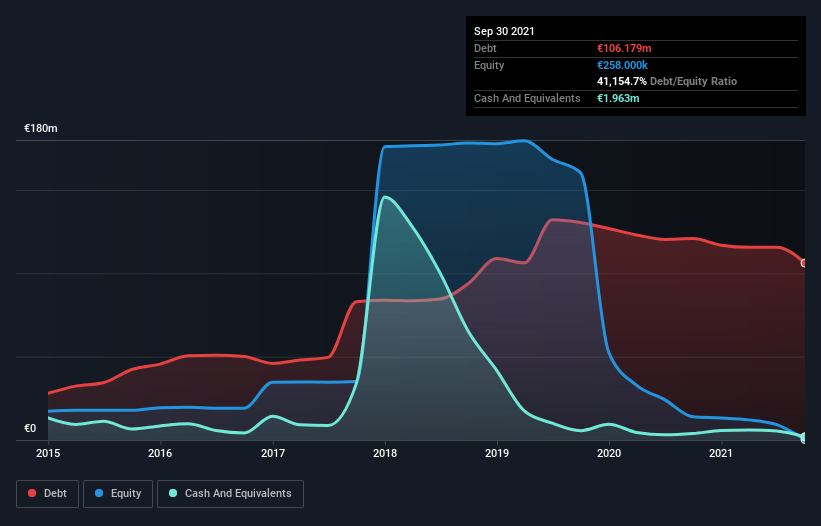- Germany
- /
- Auto Components
- /
- XTRA:PGN
Health Check: How Prudently Does paragon GmbH KGaA (ETR:PGN) Use Debt?
Some say volatility, rather than debt, is the best way to think about risk as an investor, but Warren Buffett famously said that 'Volatility is far from synonymous with risk.' When we think about how risky a company is, we always like to look at its use of debt, since debt overload can lead to ruin. Importantly, paragon GmbH & Co. KGaA (ETR:PGN) does carry debt. But the real question is whether this debt is making the company risky.
When Is Debt A Problem?
Debt assists a business until the business has trouble paying it off, either with new capital or with free cash flow. If things get really bad, the lenders can take control of the business. However, a more common (but still painful) scenario is that it has to raise new equity capital at a low price, thus permanently diluting shareholders. Having said that, the most common situation is where a company manages its debt reasonably well - and to its own advantage. The first thing to do when considering how much debt a business uses is to look at its cash and debt together.
View our latest analysis for paragon GmbH KGaA
What Is paragon GmbH KGaA's Net Debt?
You can click the graphic below for the historical numbers, but it shows that paragon GmbH KGaA had €106.2m of debt in September 2021, down from €120.8m, one year before. And it doesn't have much cash, so its net debt is about the same.

A Look At paragon GmbH KGaA's Liabilities
The latest balance sheet data shows that paragon GmbH KGaA had liabilities of €139.6m due within a year, and liabilities of €48.0m falling due after that. On the other hand, it had cash of €1.96m and €10.2m worth of receivables due within a year. So it has liabilities totalling €175.4m more than its cash and near-term receivables, combined.
This deficit casts a shadow over the €33.9m company, like a colossus towering over mere mortals. So we'd watch its balance sheet closely, without a doubt. At the end of the day, paragon GmbH KGaA would probably need a major re-capitalization if its creditors were to demand repayment. When analysing debt levels, the balance sheet is the obvious place to start. But you can't view debt in total isolation; since paragon GmbH KGaA will need earnings to service that debt. So when considering debt, it's definitely worth looking at the earnings trend. Click here for an interactive snapshot.
Over 12 months, paragon GmbH KGaA made a loss at the EBIT level, and saw its revenue drop to €181m, which is a fall of 7.3%. That's not what we would hope to see.
Caveat Emptor
Over the last twelve months paragon GmbH KGaA produced an earnings before interest and tax (EBIT) loss. Indeed, it lost a very considerable €30m at the EBIT level. If you consider the significant liabilities mentioned above, we are extremely wary of this investment. That said, it is possible that the company will turn its fortunes around. But we think that is unlikely since it is low on liquid assets, and made a loss of €20m in the last year. So we think this stock is quite risky. We'd prefer to pass. The balance sheet is clearly the area to focus on when you are analysing debt. But ultimately, every company can contain risks that exist outside of the balance sheet. To that end, you should learn about the 3 warning signs we've spotted with paragon GmbH KGaA (including 1 which makes us a bit uncomfortable) .
Of course, if you're the type of investor who prefers buying stocks without the burden of debt, then don't hesitate to discover our exclusive list of net cash growth stocks, today.
New: AI Stock Screener & Alerts
Our new AI Stock Screener scans the market every day to uncover opportunities.
• Dividend Powerhouses (3%+ Yield)
• Undervalued Small Caps with Insider Buying
• High growth Tech and AI Companies
Or build your own from over 50 metrics.
This article by Simply Wall St is general in nature. We provide commentary based on historical data and analyst forecasts only using an unbiased methodology and our articles are not intended to be financial advice. It does not constitute a recommendation to buy or sell any stock, and does not take account of your objectives, or your financial situation. We aim to bring you long-term focused analysis driven by fundamental data. Note that our analysis may not factor in the latest price-sensitive company announcements or qualitative material. Simply Wall St has no position in any stocks mentioned.
Have feedback on this article? Concerned about the content? Get in touch with us directly. Alternatively, email editorial-team (at) simplywallst.com.
About XTRA:PGN
paragon GmbH KGaA
Develops, produces, and distributes automotive electronics, body kinematics, and e-mobility solutions for the automotive industry in Germany, European Union, and internationally.
Good value with imperfect balance sheet.
Market Insights
Community Narratives



